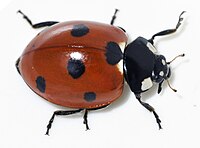
Photo from wikipedia
Fungi are diverse organisms that occupy important niches in natural settings and agricultural settings, acting as decomposers, mutualists, and parasites and pathogens. Interactions between fungi and other organisms, specifically invertebrates,… Click to show full abstract
Fungi are diverse organisms that occupy important niches in natural settings and agricultural settings, acting as decomposers, mutualists, and parasites and pathogens. Interactions between fungi and other organisms, specifically invertebrates, are understudied. Their numbers are also severely underestimated. Invertebrates exist in many of the same spaces as fungi and are known to engage in fungal feeding or mycophagy. This review aims to provide a comprehensive, global view of mycophagy in invertebrates to bring attention to areas that need more research, by prospecting the existing literature. Separate searches on the Web of Science were performed using the terms “mycophagy” and “fungivore”. Invertebrate species and corresponding fungal species were extracted from the articles retrieved, whether the research was field- or laboratory-based, and the location of the observation if field-based. Articles were excluded if they did not list at least a genus identification for both the fungi and invertebrates. The search yielded 209 papers covering seven fungal phyla and 19 invertebrate orders. Ascomycota and Basidiomycota are the most represented fungal phyla whereas Coleoptera and Diptera make up most of the invertebrate observations. Most field-based observations originated from North America and Europe. Research on invertebrate mycophagy is lacking in some important fungal phyla, invertebrate orders, and geographic regions.
Journal Title: Journal of Fungi
Year Published: 2023
Link to full text (if available)
Share on Social Media: Sign Up to like & get
recommendations!